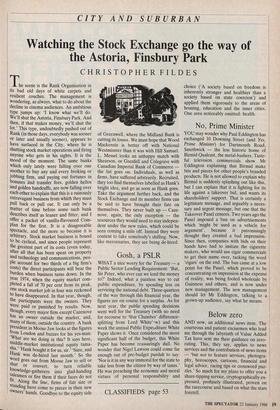CITY AND SUBURBAN
Watching the Stock Exchange go the way of the Astoria, Finsbury Park
CH RISTOPHER FILDES
The scene is the Rank Organisation in its bad old days of white carpets and resilient couches. The management is wondering, as always, what to do about the decline in cinema audiences. An ambitious type jumps up: 'I know what we'll do. We'll shut the Astoria, Finsbury Park. And then, if that makes money, we'll shut the lot.' This type, undoubtedly pushed out of Rank (in those days, everybody was sooner or later and usually sooner), appears to have surfaced in the City, where he is shutting stock market operations and firing anyone who gets in his sights. It is the mood of the moment. The same banks which only lately were falling over one another to buy any and every broking or jobbing firm, and paying out fortunes in bonuses and transfer fees, golden hellos and golden handcuffs, are now falling over each other to explain that this is a ruinously extravagant business from which they must pull back or pull out. It can only be a matter of time before some such bank describes itself as leaner and fitter, and I offer a packet of vanilla-flavoured Com- plan for the first. It is a disagreeable spectacle, and the more so because it is arbitrary. Stock market business is bound to be cyclical, and since people represent the greatest part of its costs (even today, after all that has been spent on property and technology and communications, peo- ple account for two thirds of a big firm's costs) the direct participants will bear the burden when business turns down. In the year 1974, when the equity market com- pleted a fall of 70 per cent from its peak, one stock market job in four was reckoned to have disappeared. In that year, though, the participants were the owners. They were paid or punished by results. Now, though, every major firm except Cazenove has an owner outside the market, and, many of them, outside the country. A bank president in Moose Jaw looks at the figures from London and buzzes for his yes-man: What are we doing in this? It says here, middle-market institutional equity tama- sha: 'Hank bought it for us, sir."Sure, and Hank was de-hired last month.' So the Word goes out from Moose Jaw to sell or shut or convert, to turn reliable knowledge-gatherers into glad-handing salesmen or fire them if their faces do not fit. Along the line, firms of fair size or standing have come to pieces in their new owners' hands. Goodbye to the equity side of Greenwell, where the Midland Bank is cutting its losses. We must hope that Wood Mackenzie is better off with National Westminster than it was with Hill Samuel. L. Messel looks an unhappy match with Shearson, or Grenfell and Colegrave with Canadian Imperial Bank of Commerce the list goes on. Individuals, as well as firms, have suffered arbitrarily. Recruited, they too find themselves labelled as Hank's bright idea, and go as soon as Hank goes. Take the argument further back, and the Stock Exchange and its member firms can be said to have brought their fate on themselves. They never built up — Caze- nove, again, the only exception — the resources they would need to stay indepen- dent under the new rules, which could be seen coming a mile off. Instead they were content to take somebody's shilling. Now, like mercenaries, they are being de-hired.


























































 Previous page
Previous page